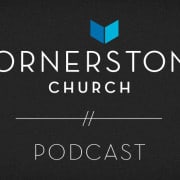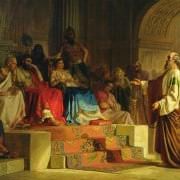Acts is Luke’s second part to his gospel. He addresses it to Theophilus, probably a name for a judge or lawyer, as he did his gospel account. In Acts, Luke shows us what Christ continued to do in the earth by the Holy Spirit. The book is exciting reading full of energy and action. Admittedly, it doesn’t have as much action as his gospel that covers a history of three and half years (excluding Jesus’ early years) as Acts covers about thirty years of history (A.D 33 – A.D 63).
Acts is not difficult to understand like some Old Testament books. It tells us stories and explains happenings in the life of Peter and Paul in particular. It is a collection of high and low points. A summary of thirty years of history will always be that. Please keep this point in mind when you read it. More than one person has felt ineffective and unproductive in their life for Jesus after seeing in Acts all that was accomplished. You may think this is an every day life of thrills and drama. Not so, Paul spent a lot of time in prison doing nothing at all but praying and thinking and talking. The gaps in Acts speak just as much as the activity. The Holy Spirit leads us as he lead them.
Acts has a lot to teach us about many aspects of our Christian life. In the characters of the disciples we see simple, straightforward and successful men and women. They depend entirely upon the power of God and move with an unflinching zeal and determination. They are examples to follow. Focus in on what they did and what they were. As with the Old Testament, do your best to get into the story and feel the characters and situations. Many of the places spoken of can be brought to more life with an online search for photos and maps. I encourage you to consult the maps at the back of your Bible. There you will see just how far they travelled and what town and cities were like where they ministered.
Acts has lot to teach us but you do need to be aware (as do many church leaders) that Acts teaches us descriptively, not prescriptively. The narrative tells us what they did; it’s our role to determine what we need to do. It may be the same, similar, or not necessary. This is the difficult part. Many people take Acts too prescriptively.
There are a good few “once-offs” in the book of Acts. For example, technically speaking, there are people looking for a second Pentecost, but there never will be one like Acts 2 – it was a once off. The Holy Spirit is already here. We need to consult the epistles for confirmation on what was a once-off and what was to continue. Again this is not a simple task but a very important one.
Acts introduces us to a few new concepts not seen before. We meet the apostle Paul who will turn out to write most of the New Testament. We see Christians being baptised in water. Baptism in the Holy Spirit is totally new in Acts. Christians form a church – a never before understood people. People will relate to God in a new way and the Law of Moses will not be the way they will do it in future.
This book should encourage you along with whatever else the Holy Spirit highlights to get busy for Jesus. We see these raw new followers energised and willing to work with Jesus. May God give us such energy and success!
Pic: Paul on trial before Agrippa (Acts 26), as pictured by Nikolai Bodarevsky, 1875.




